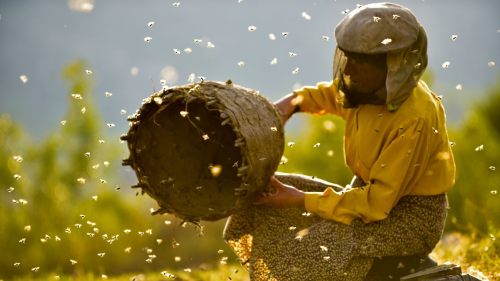EATING ANIMALS Review: Trim The Fat
I really want to support the message of Eating Animals. I'm not myself a vegetarian, but I've long recognized the quandary of eating meat in America, as almost all of it comes from large corporate farms that abuse and genetically manipulate their livestock to produce maximum yield and profits, regardless of the ethical issues that are inherent in their processes. It's important for people to recognize how they implicitly support a corrupt industry through their purchasing power, and even though the world is a trash fire for any number of other and more immediate reasons right now, the issues presented in Eating Animals are ones that need to be reckoned with in the voting booth and in the marketplace. And yet I have a hard time supporting Eating Animals itself, as documentarian Christopher Dillon Quinn, adapting the book of the same title by Jonathan Safran Foer, presents Eating Animals as an appeal for Middle America to return to traditionalism, which comes across as hucksterism and condescension as the film spends too much time bemoaning how the global market has left local farmers in the dust.
When Eating Animals gets it right, it's a film that serves as a disturbing and eye-opening glimpse into the world of factory farming. Through talking head interviews, tours of individually-owned mass-production farms, and, most damningly, undercover footage of livestock processing facilities and the managers of those facilities getting up in arms over the surveillance, the film paints a picture of animals created to live short and tortured lives, bred to be physically incapable of movement, subject to squalid and disease-ridden living conditions, and mishandled by workers who don't see these living things as anything but the meat they are destined to become. But effects of this industry are more widespread than just how it harms the animals, as the documentary explores the ramifications of factory farming on pollution, climate change, human health, and global economies, and it's hard not to remember how all these pieces fit together the next time you bite into a hamburger. A great chunk of this film is harrowing and disturbing, viscerally reinforced with footage of a world that animal product consumers understandably would rather not think about.
However, amongst the wealth of shocking imagery and compelling arguments are some tedious and almost entirely perfunctory examinations of how small farms haven't been able to keep up with the production demands of large companies like Tyson. The ways in which these corporate interests have systematically divided and conquered farming communities is terrible, but Eating Animals has a tendency to look back on pre-industrial farming with a nostalgic admiration that doesn't acknowledge any issues with meeting demand in a rapidly expanding world. The film does divert briefly into an exploration of plant-based meat alternatives, which look like a mass-producible and cost-effective way to wean the world off its fascination with meat. But the majority of the solutions in Eating Animals play off its audience's apparent sentimentality for farmers who have clung to the old ways, conflating their histories of personal woe with being left in the economic dust as Natalie Portman narrates in poetic prose that might as well have been screaming "We're trying to emotionally manipulate you!"
I'm not opposed to small farmers making a living by raising livestock ethically, but I do oppose how Eating Animals presents this alternative as the primary means to combat the factory farming industry without examining the potential downsides or weighing other alternatives in more than a perfunctory fashion. There's a lot of compelling information and argument here, particularly in regards to the footage of animal abuse, but the presentation goes over the top in how it wants you to bemoan the past at the expense of looking toward the future. The goal here is to clearly make people care about the ills of factory farming, if not just from an animal advocacy standpoint, then from an appeal to the devastation suffered by rural communities that the audience may themselves be a part of. But the film is in no way shy about showing its agenda to favor one path forward over all others. It's the appeal to emotionally vulnerable rural communities that feels so manipulative in its unwillingness to consider the problems inherent in small farms reclaiming a dominance in modern America. And there's a very real chance that this tactic is set to backfire; people know when they're being condescended to, and the audience set to receive these messages already knows the perilous fate of their communities, even if not the structural causes of that fate. It makes one wish the memoriam for a rose-tinted past had been left on the cutting room floor, because it makes the actually compelling pieces suffer by proximity.



